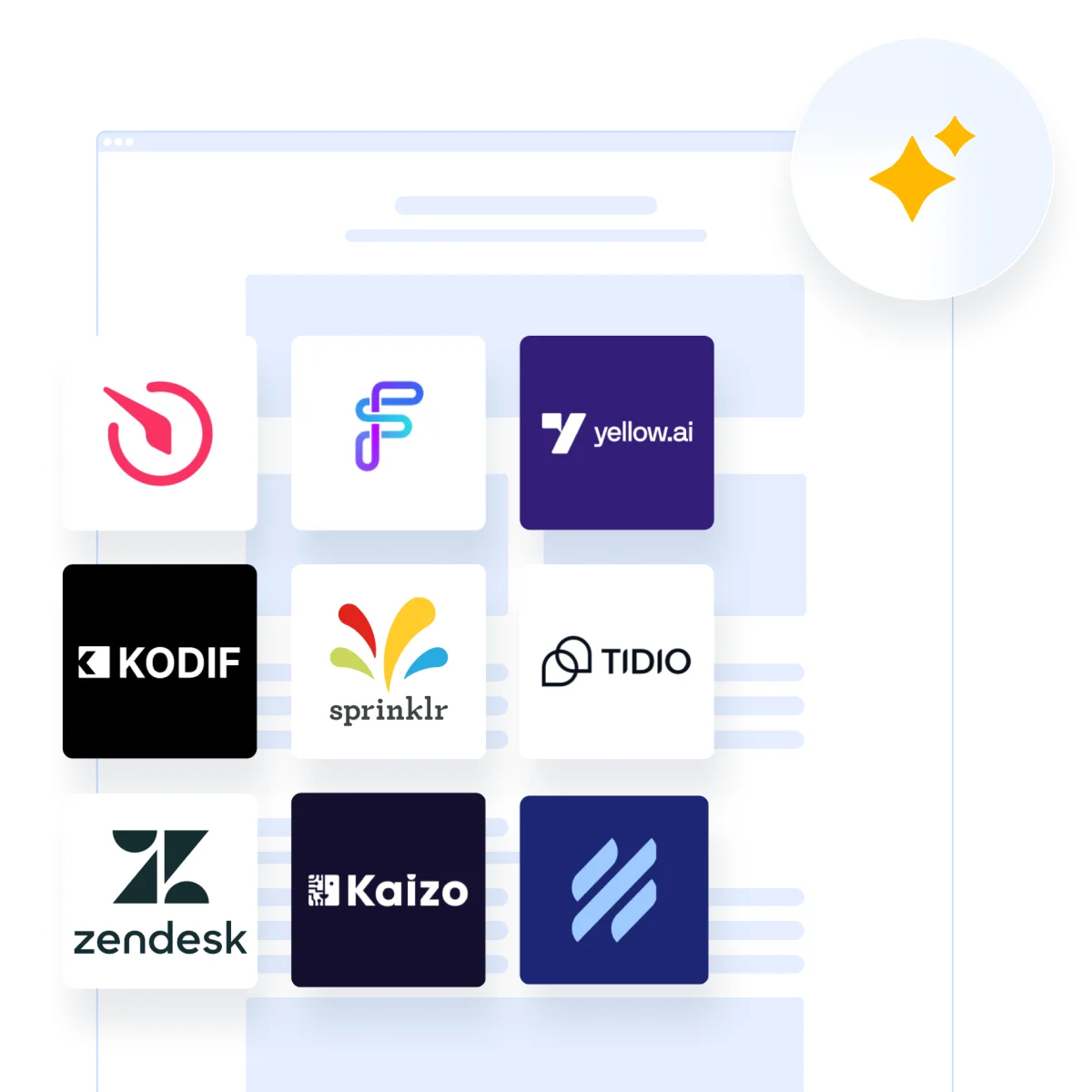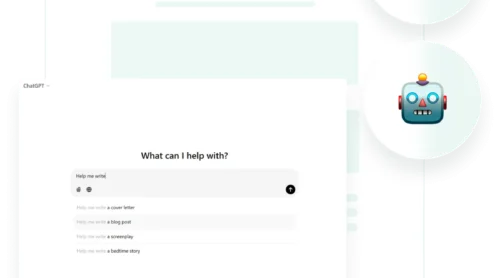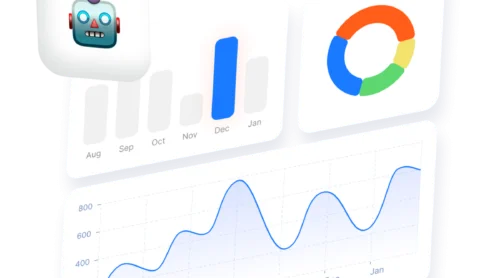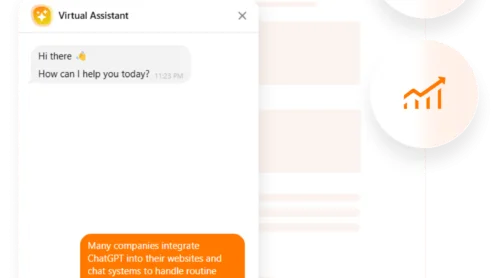AI is revolutionizing customer service, enabling businesses to provide faster, more personalized support while improving efficiency. With tools powered by machine learning and natural language processing, companies can automate responses, analyze customer sentiment, and streamline operations — reducing wait times and enhancing overall satisfaction.
As customer expectations continue to rise, adopting AI-driven solutions is no longer optional but essential for staying competitive. In this article, we’ll explore some of the best AI customer support tools that can transform your service strategy and drive business success.
AI Tools for Customer Service: Summary Table
We’ll discuss various AI tools, from chatbots that provide instant support to automation platforms that streamline workflows. We’ll also cover AI-powered analytics for deeper customer insights and predictive support solutions that boost efficiency. These technologies help businesses deliver faster, smarter, and more personalized customer experiences.
Here’s a brief overview of the AI customer service solutions we’ll talk about:
| Tool name | Functionality | Pricing | Key features |
|---|---|---|---|
| Elfsight AI Chatbot | AI-powered chatbot for website integration | Free plan; paid plans start at $5/month | Customizable templates, easy integration, multilingual support |
| Forethought AI | AI solution for ticket classification and routing | Custom pricing | AI-driven ticket categorization, fast routing, NLP-powered |
| Yellow.ai | Omnichannel conversational AI for businesses | Free plan; Custom pricing for paid plans | Multilingual, cross-channel, customizable workflows |
| Kodif AI | AI-driven FAQs and automation for customer support | Pricing available upon request | Integrates with live chat, pre-built FAQ automation |
| Sprinklr AI | AI-powered customer experience and engagement platform | Selve-serve plan at $199 per seat/month; custom pricing for enterprise solutions | Multichannel AI, sentiment analysis, reporting |
| Tidio | AI chatbot and live chat integration | Starts at $29/month | Multi-channel live chat, AI-powered chatbot |
| Zendesk AI | Ticket automation and management with AI assistance | Custom pricing | Ticket automation, reporting, AI-powered suggestions |
| Kaizo | AI-based performance analytics and real-time feedback | Starts at $16 per user/month | Agent performance tracking, real-time feedback |
| Help Scout | AI-assisted help desk automation and ticket management | Starts at $25/month | AI-assisted support, ticket management, reporting |
1. Elfsight AI Chatbot
Elfsight AI Chatbot widget is a highly customizable and easy-to-integrate solution designed to enhance website customer support with minimal technical effort. It offers an intuitive editor where you can teach the chatbot and configure automated workflows to improve customer interaction.
This solution is ideal for businesses looking to engage with visitors 24/7, reduce response time, and increase user satisfaction without a large resource investment. Businesses can embed the chatbot on their website and across various platforms: WordPress, Shopify, Wix, WooCommerce, etc.
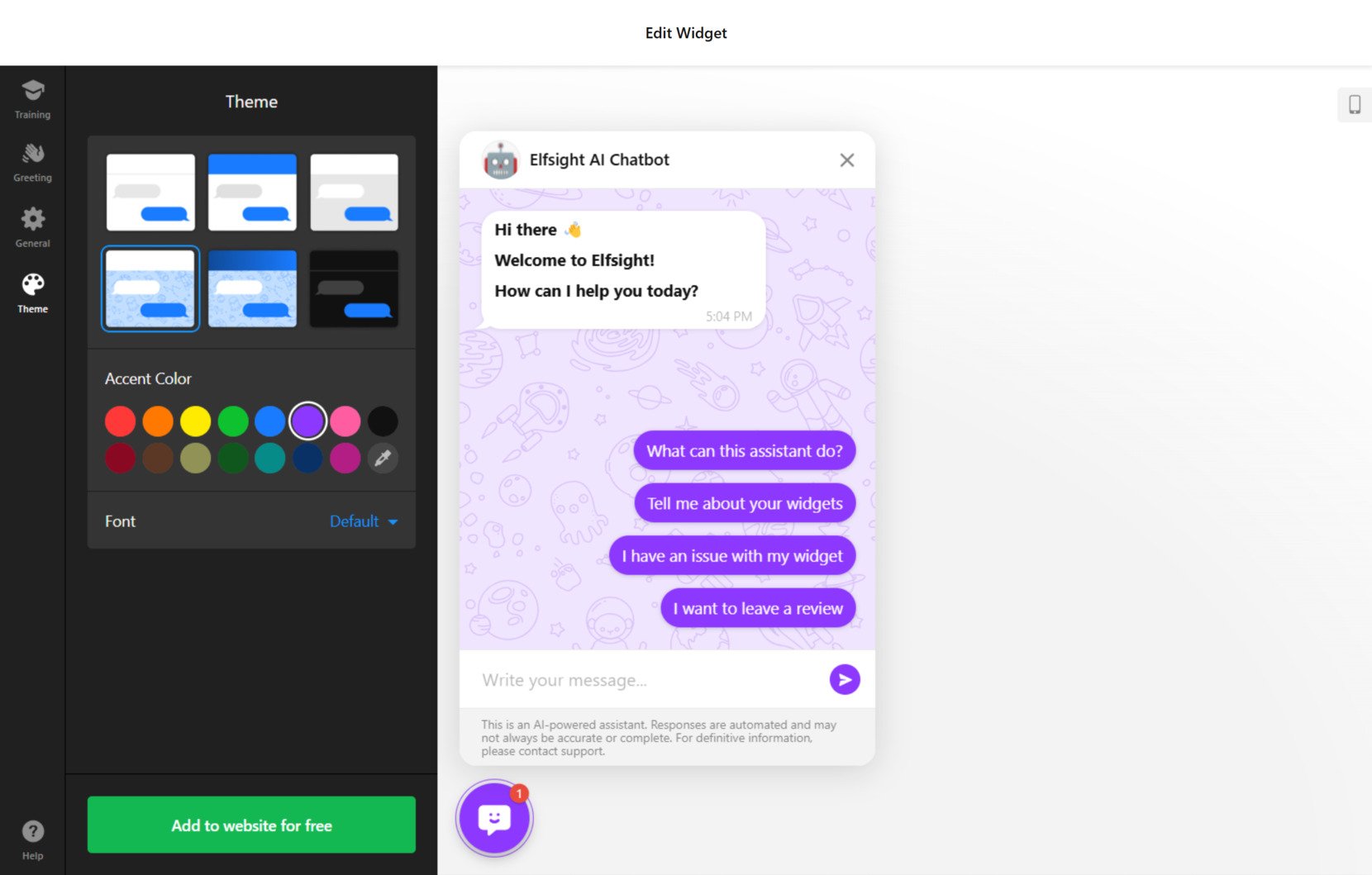
Key features:
- Automated customer interactions. Utilizing advanced AI technology, the chatbot provides 24/7 assistance, accurately understanding and responding to user inquiries, thereby improving overall satisfaction.
- Effortless onboarding. The widget includes an intuitive instruction generator that allows you to inform the assistant about your business by sharing a website link or company details, ensuring precise and context-aware responses.
- Unlimited scalability. With no restrictions on the number of chats or users, the chatbot can handle numerous customer interactions simultaneously, making it ideal for high-traffic periods.
- Rapid deployment. The user-friendly installation process enables quick embedding of the chatbot into your website without requiring technical expertise, allowing you to focus on engaging with your audience promptly.
- Personalized user experience. The chatbot remembers customer names and preferences, allowing for tailored conversations that resonate on a personal level, enhancing user engagement and satisfaction.
Pricing: Starts at $5/month; free plan available to test the tool’s capabilities or for basic functionality.
See the AI Chatbot for customer service in action! ⬇
2. Forethought AI
Forethought AI utilizes advanced AI and machine learning techniques to streamline and automate customer support ticketing, categorization, and routing. Its machine learning model intelligently categorizes incoming tickets and routes them to the right agent based on the context, significantly improving response times.
Forethought also provides proactive assistance by offering automatic responses to common issues, reducing the burden on human agents. This allows customer support teams to focus on more complex cases while AI handles the repetitive tasks efficiently.
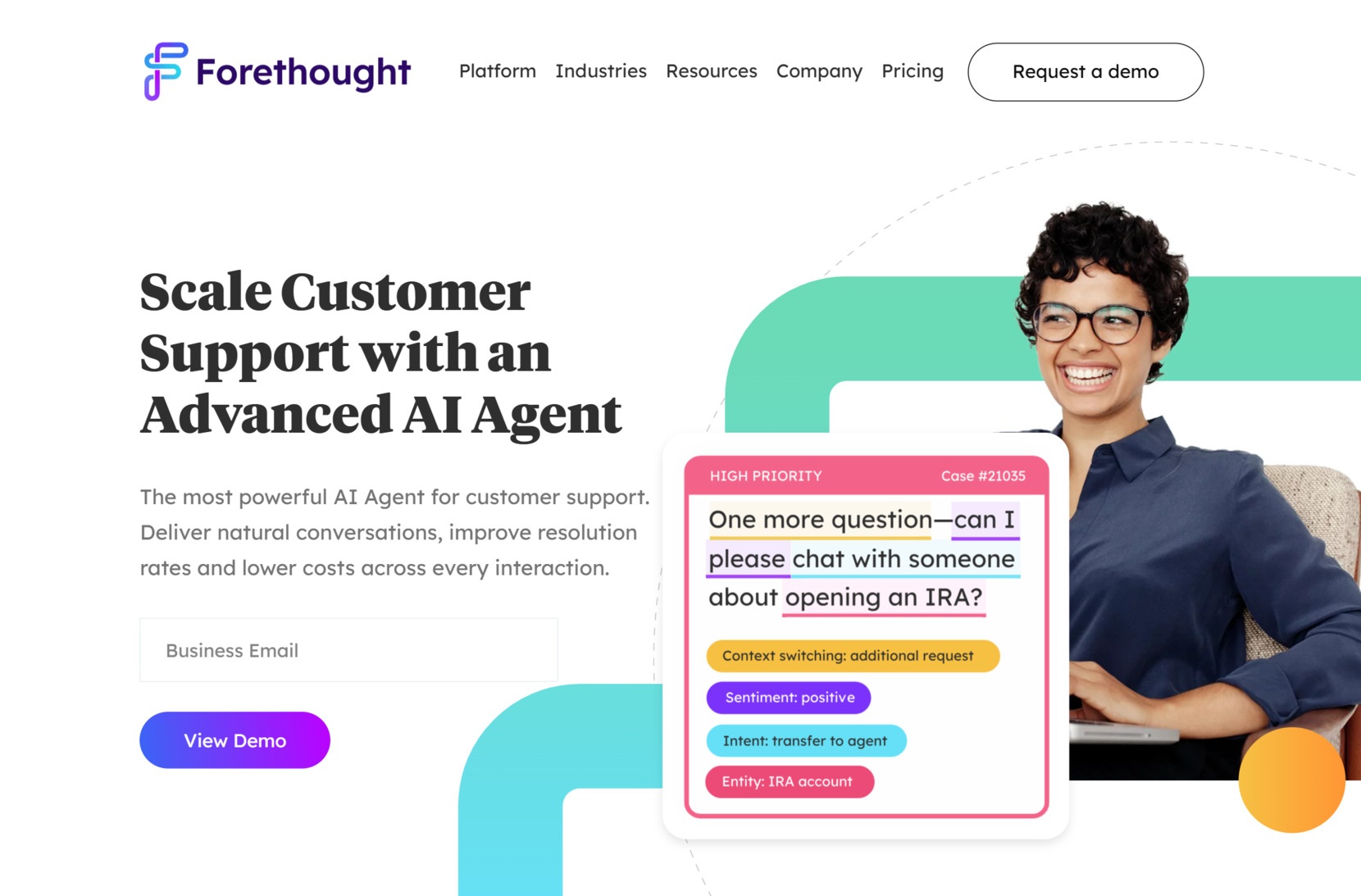
Key features:
- Predictive ticket routing. AI analyzes tickets and intelligently assigns them to the most appropriate agents based on ticket content.
- Automated ticket resolution. Forethought can automatically resolve tickets for frequently asked questions, improving operational efficiency.
- AI-driven insights. Provides businesses with performance analytics, highlighting areas for improvement and agent performance metrics.
- Customizable workflow. Flexibility to adjust ticket processing workflows based on business-specific requirements and needs.
Pricing: Custom pricing is available based on the scope of your operations and the number of agents.
3. Yellow.ai
Yellow.ai offers a comprehensive conversational AI platform that enables businesses to engage with customers through both text and voice interactions. It is designed to support a wide range of communication channels, including social media, messaging apps, email, and even phone-based conversations.
By providing omnichannel support, Yellow.ai ensures that businesses can meet customers where they are, with consistent experiences across platforms. Additionally, the platform incorporates advanced sentiment analysis to better understand customer emotions and tailor interactions accordingly.
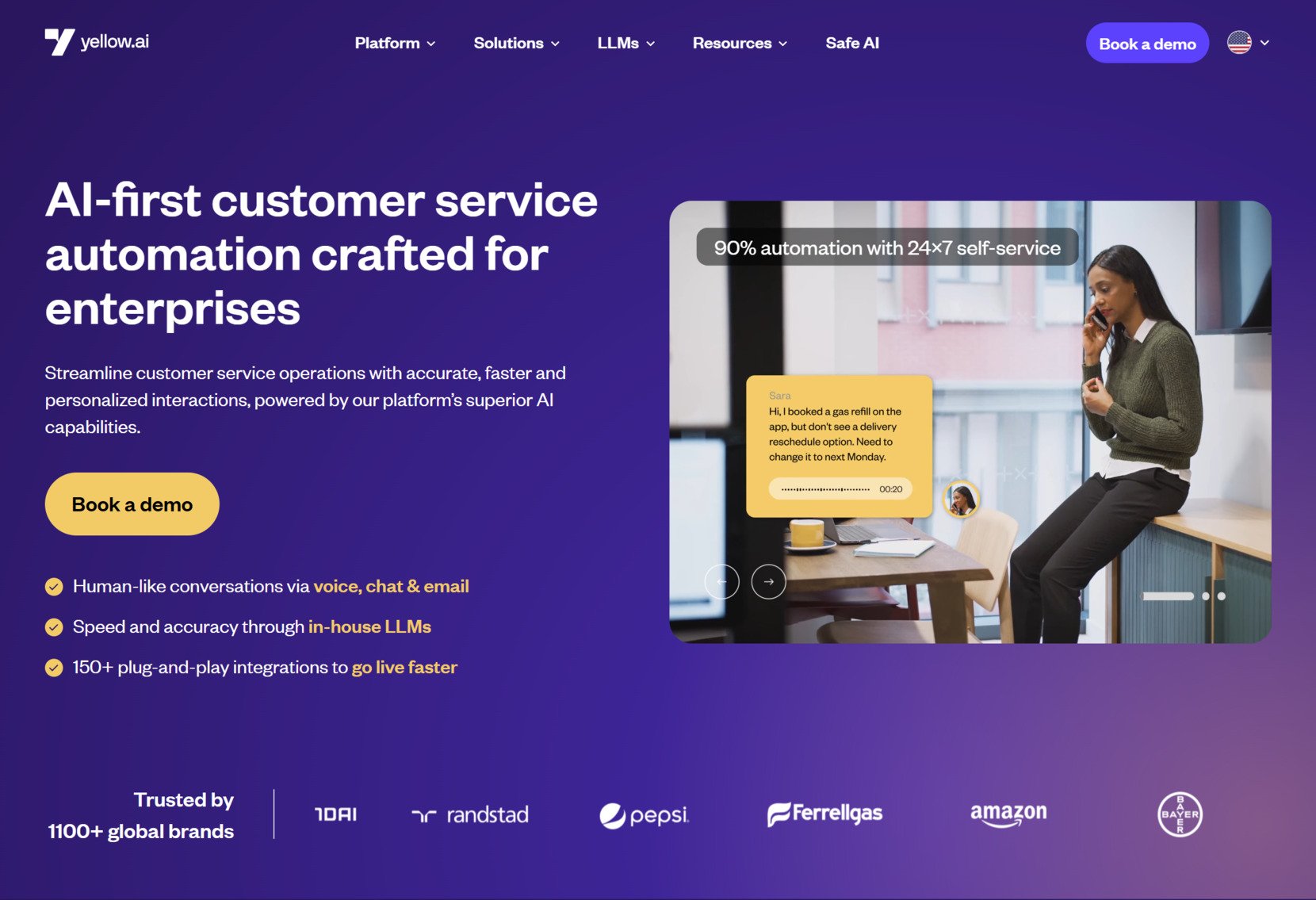
Key features:
- Omnichannel AI support. Engages customers across different platforms, including WhatsApp, Facebook Messenger, and email, offering a seamless experience.
- Voice assistants. In addition to chatbots, Yellow.ai also offers AI-powered voice assistants to handle voice interactions with customers.
- Advanced sentiment analysis. Uses AI to analyze customer sentiment in real-time, helping businesses understand customer emotions for more personalized support.
- NLP capabilities. Yellow.ai supports over 135 languages, making it an excellent choice for businesses with international customers.
Pricing: Limited free plan is available; custom pricing for paid plans, based on your specific business needs and scale of operations.
4. Kodif
Kodif is a cutting-edge AI platform designed to automate customer support by using OpenAI’s GPT technology. It empowers businesses to create custom AI workflows, allowing the system to automatically resolve repetitive issues and streamline ticket management.
By leveraging ChatGPT, Kodif can understand and respond to a wide range of customer inquiries with greater accuracy. This enables businesses to reduce manual workload and improve customer satisfaction by ensuring faster response times for common queries.
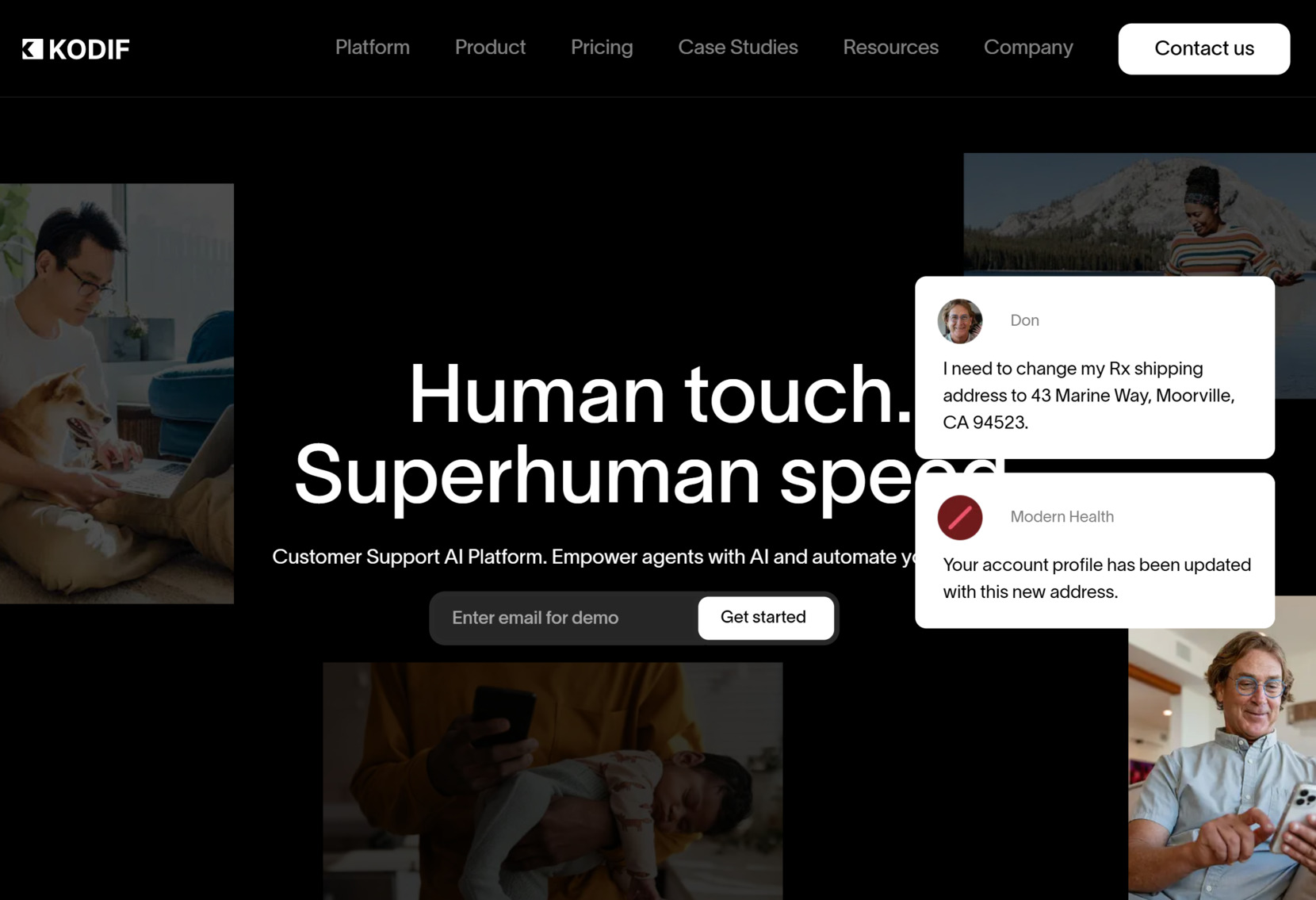
Key features:
- Customizable AI responses. Kodif allows businesses to tailor responses and workflows, making the AI better suited to specific industries.
- Advanced ticket automation. The AI can resolve tickets by providing solutions for common customer issues without human intervention.
- Seamless integrations. Easily integrates with popular customer service platforms like Zendesk and Salesforce to ensure smooth workflows.
- Real-time reporting. Provides businesses with detailed reports on performance, helping optimize AI workflows for better efficiency.
Pricing: Custom pricing, based on the scale of usage and feature needs.
5. Sprinklr AI
Sprinklr AI offers an all-in-one customer support platform that enables businesses to deliver personalized support across multiple channels. This tool supports social media, live chat, email, and messaging apps, providing businesses with a centralized hub to manage customer interactions.
The tool’s AI capabilities are designed to help businesses analyze customer sentiment, automate ticketing workflows, and provide deep insights into customer behavior. This comprehensive solution is ideal for businesses that want to manage customer experience at scale while ensuring their AI-powered support is smart and adaptive.
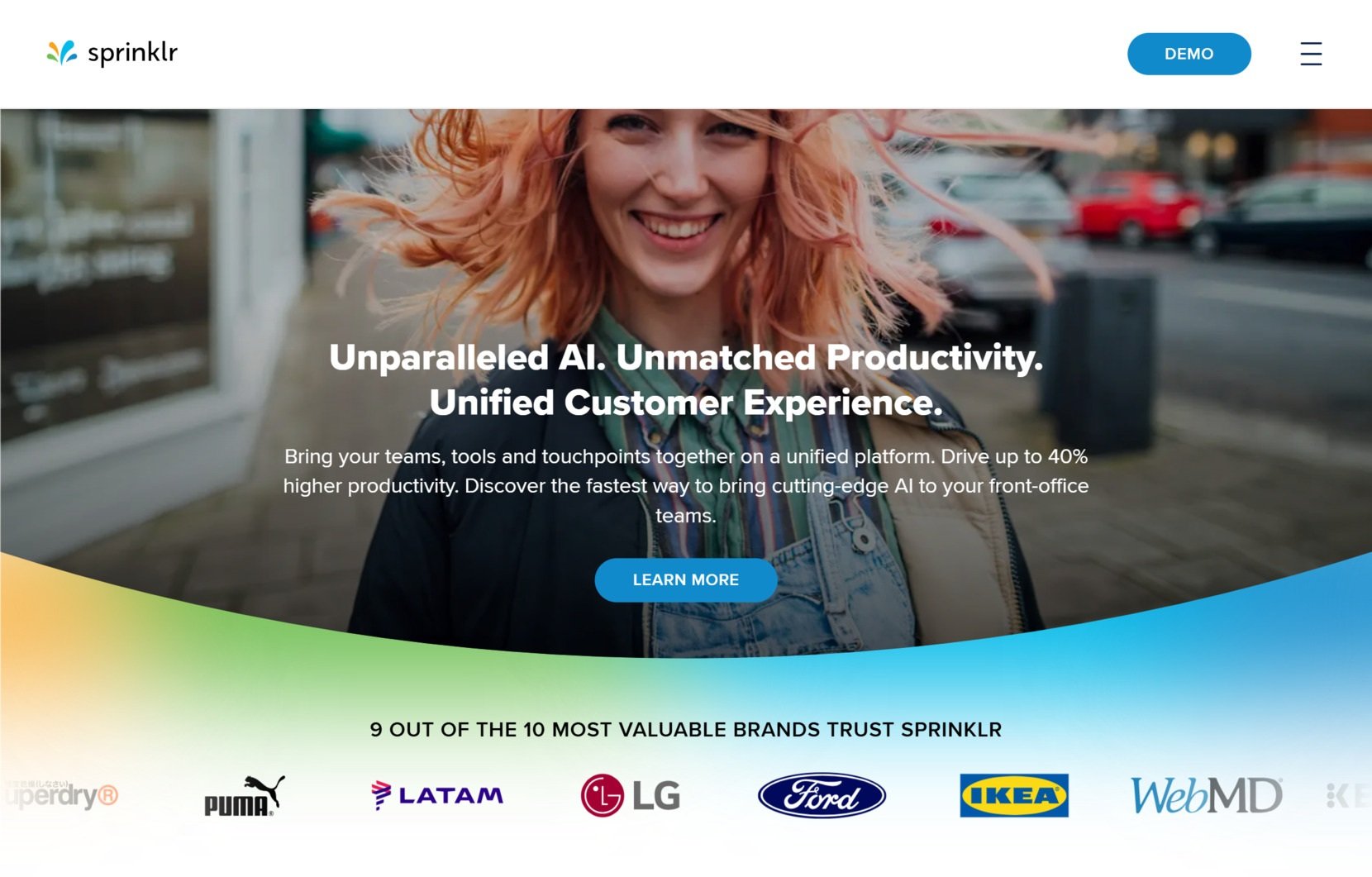
Key features:
- Omnichannel engagement. Supports engagement across 35+ channels, making it easy to provide consistent support everywhere.
- AI-driven sentiment analysis. Analyzes customer sentiment to personalize interactions and identify emerging trends.
- Automated ticket routing and resolution. AI quickly categorizes and routes tickets to the right agents or resolves common queries automatically.
- Powerful analytics and reporting. Provides actionable insights into customer behavior, helping businesses optimize customer service strategies.
Pricing: Starts at $199 per month for the self-service plan. Custom pricing for the AI tools and full platform suite.
6. Tidio
Tidio is an AI-powered chatbot and live chat platform designed to improve customer support by providing quick, automated responses to frequently asked questions. It integrates seamlessly with websites, eCommerce platforms, and social media to ensure a unified customer service experience.
The AI capabilities of this tool are enhanced by machine learning, enabling the chatbot to evolve based on user interactions. It’s a user-friendly solution that also includes automation features for eCommerce businesses looking to improve customer service efficiency and engagement.
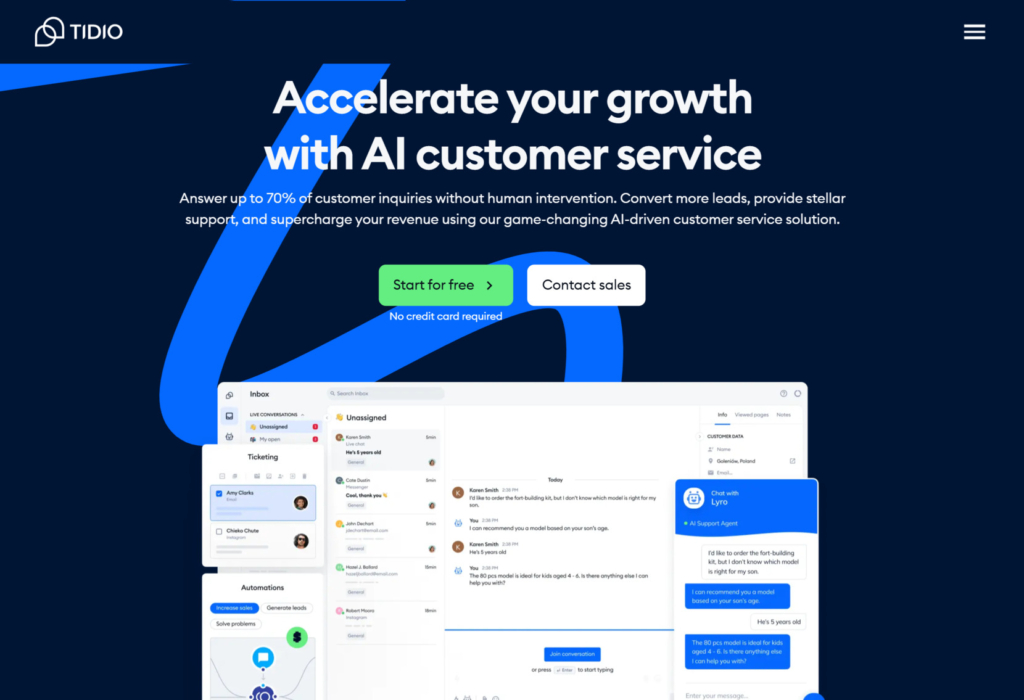
Key features:
- Chatbots & live chat integration. Combines the efficiency of AI chatbots with the flexibility of live chat support for more complex inquiries.
- Automated responses. Tidio provides automated responses to FAQs, reducing the time human agents spend on repetitive inquiries.
- Multi-channel support. Integrates with email, Facebook Messenger, and websites to centralize customer support across various touchpoints.
- eCommerce features. Includes tools for cart recovery, order updates, and customer segmentation for personalized support in the eCommerce space.
Pricing: Starts at $29/month.
7. Zendesk AI
Zendesk AI is a robust customer service solution with AI-driven automation and analytics to enhance customer support workflows. It uses machine learning to analyze support tickets, automate responses, and optimize ticket routing to the most qualified agents.
The solution also enables self-service capabilities through automated knowledge base recommendations and chatbots. With its comprehensive integration across multiple channels like email, live chat, and social media, Zendesk is designed to provide businesses with a scalable customer service platform.
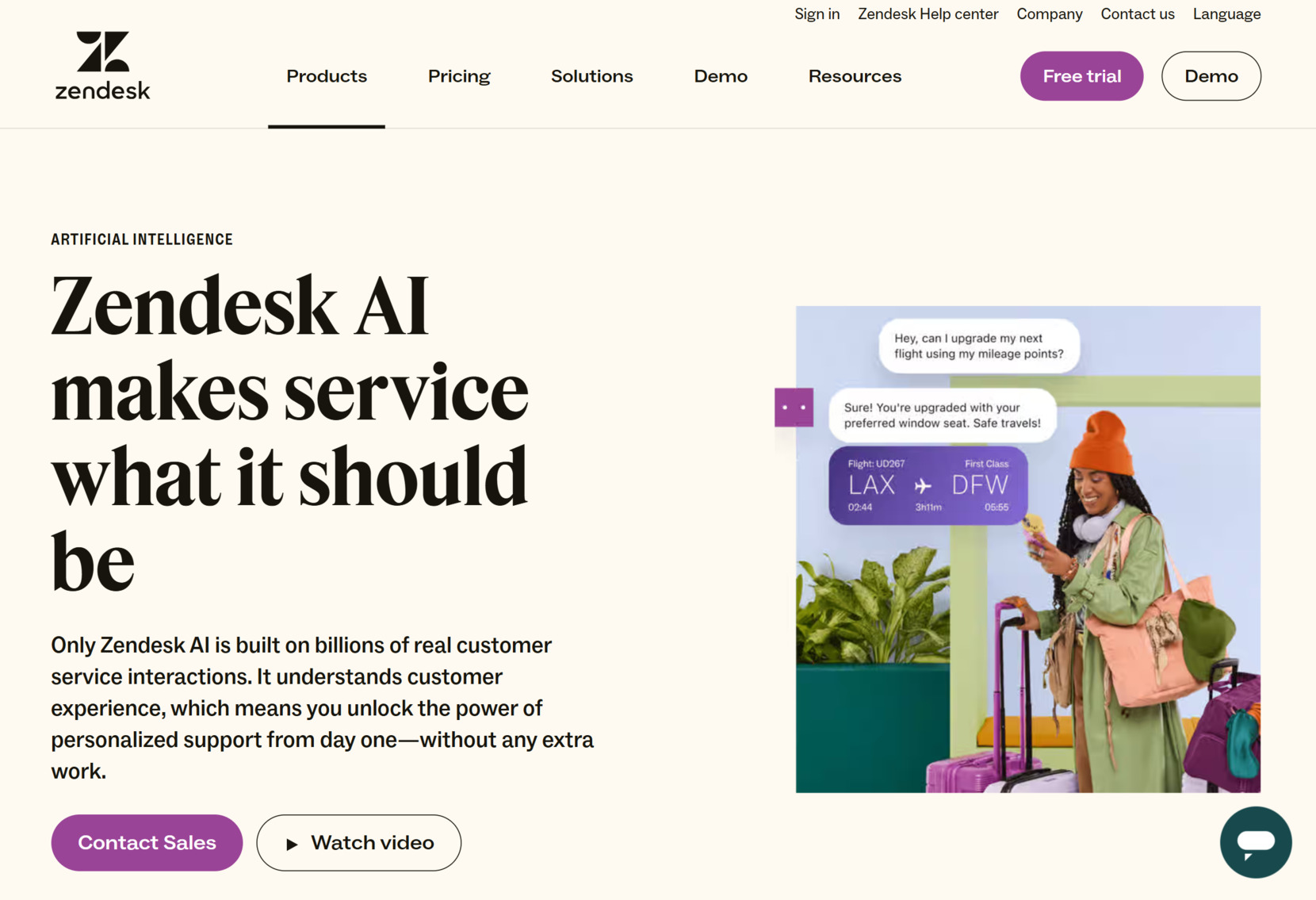
Key features:
- AI-powered ticket routing. Automatically assigns tickets to the most appropriate agents, improving response times and efficiency.
- AI-driven self-service. Empowers customers to resolve issues on their own via automated FAQs and chatbot assistance.
- Analytics & reporting. Provides in-depth reporting and real-time insights into customer satisfaction and support team performance.
- Omnichannel support. Integrates with email, live chat, social media, and more for a unified customer service experience.
Pricing: Custom pricing is available based on business needs.
8. Kaizo
Kaizo is a performance and productivity enhancement platform for customer support teams, incorporating AI-driven feedback and coaching tools. The platform’s AI offers real-time insights into agent performance, identifies areas for improvement, and provides automated feedback, which helps increase team efficiency and customer satisfaction.
The tool integrates seamlessly with existing customer service platforms, providing a smooth transition to AI-enhanced workflows. It also includes gamification features, making it an engaging tool for both agents and managers.
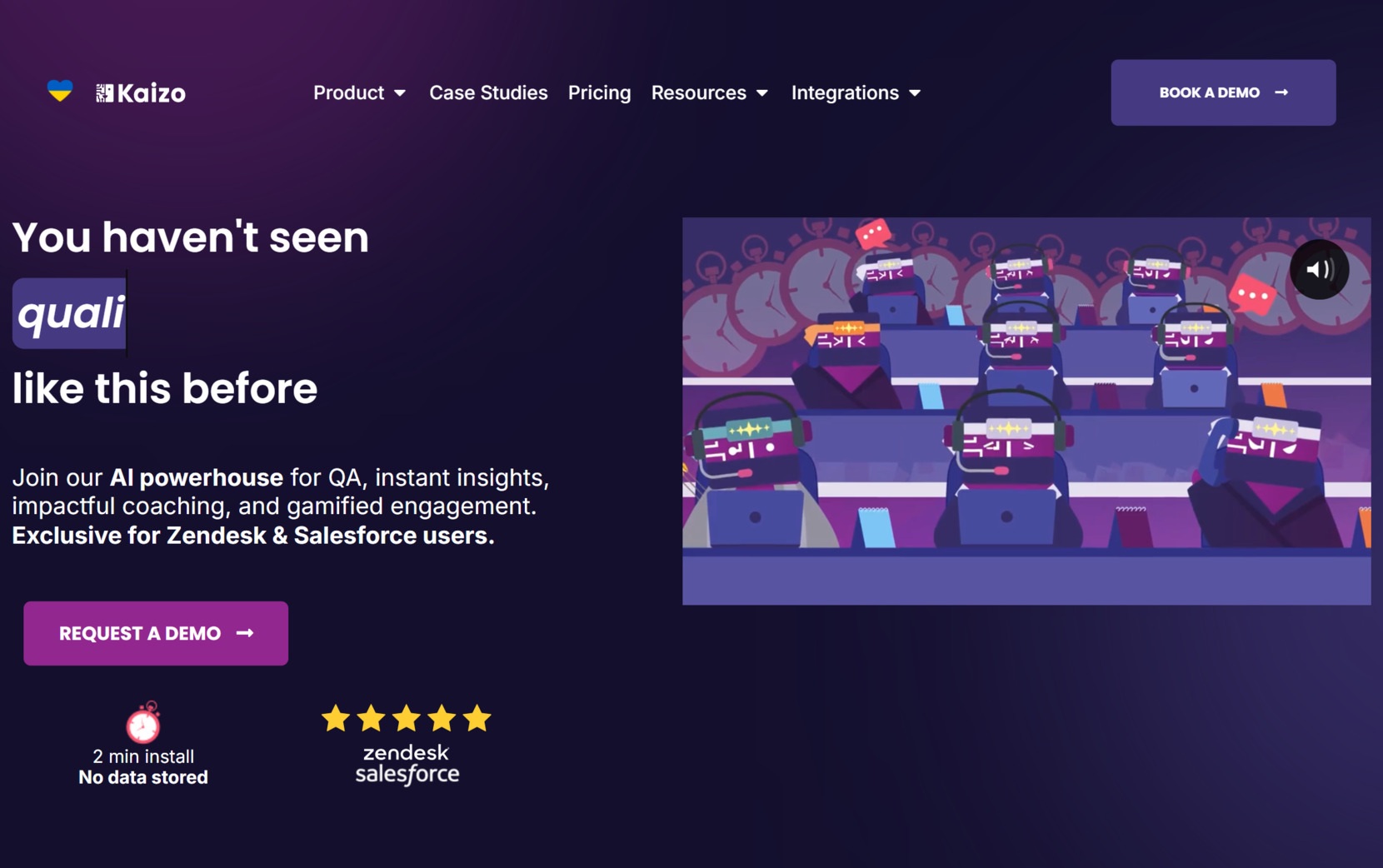
Key features:
- Real-time agent coaching. AI-driven feedback and guidance for agents, providing suggestions to improve customer service.
- Performance analytics. Detailed performance metrics help managers assess team efficiency and identify areas for improvement.
- Gamification. Adds a competitive element with gamification features, helping boost agent morale and performance.
- Customizable dashboards. Visual dashboards that offer real-time tracking of team performance metrics and KPIs.
Pricing: $16 per user/month for lowest plan; custom pricing for other tiers.
9. Help Scout
Help Scout is a customer service platform that offers AI-powered features to streamline support and improve customer experiences. It enables businesses to automate tasks like ticket categorization, customer query routing, and ticket resolution.
The solution also integrates with other tools to centralize communication and improve operational workflows. Its AI-powered self-service capabilities help businesses provide 24/7 support by offering automated knowledge base solutions and chatbots.
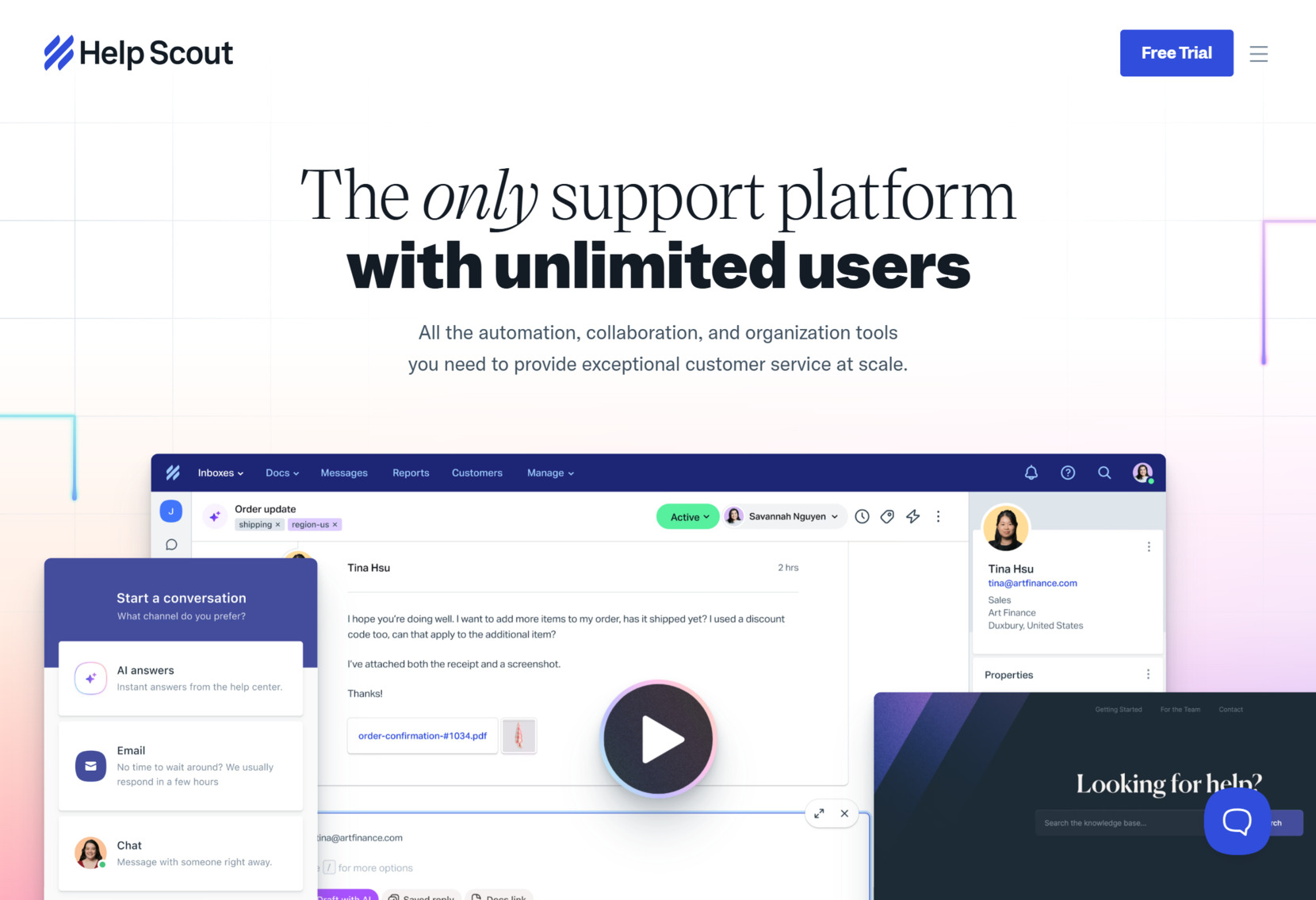
Key features:
- AI-powered ticket routing. Uses AI to analyze incoming tickets and route them to the appropriate agents.
- Automated knowledge base. Provides an automated knowledge base that helps customers find answers to their questions instantly.
- Team collaboration tools. Offers collaboration tools for support teams to efficiently work together on customer queries.
- Analytics and reporting. Tracks key performance indicators (KPIs) to measure support team productivity and customer satisfaction.
Pricing: Paid plans start at $50/month; a free plan is also available.
Criteria for Selecting AI Support Tools
When choosing the right AI tools for customer service, it’s important to evaluate solutions based on specific criteria that align with your business needs and goals. Here are the key factors to consider:
- Ease of Integration
The tool should seamlessly integrate with your existing systems, such as CRMs, helpdesk platforms, and other communication channels. A solution that fits well into your current infrastructure can save time, reduce operational disruptions, and maximize productivity. - Customization and Scalability
A good AI customer support tool should offer customization options, allowing you to tailor responses, workflows, and overall interactions to match your brand voice and business needs. Additionally, scalability is crucial. As your business grows, your AI support system should be able to handle increased volumes of customer inquiries without sacrificing efficiency. - Multichannel and Multilingual Support
In today’s multi-platform world, an effective AI tool must support various communication channels like live chat, email, social media, and even voice interactions, as well as be available in different languages. This ensures that you can provide consistent customer service wherever channel or language your customers prefer to use. - AI Capabilities and Accuracy
Assess the tool’s AI capabilities, including natural language processing (NLP) and machine learning. The more advanced the AI, the better it will be at understanding and responding to complex customer queries. Look for tools that continually improve through machine learning, allowing them to adapt to new questions and scenarios over time. - Cost and ROI
While AI tools can be an investment, they should offer a clear return on investment (ROI). Compare the pricing structure of different tools to ensure they offer the features you need at a cost that aligns with your budget. Consider both upfront costs and long-term savings from automation, improved customer satisfaction, and reduced workload for human agents. - Analytics and Reporting
Data-driven insights are crucial for improving customer service. Look for AI customer service tools that provide analytics and reporting capabilities to track performance metrics, identify trends, and optimize your customer support processes over time.
By evaluating these factors, you can choose an AI support tool that not only enhances your customer service operations but also provides long-term value for your business.
Benefits of AI Integration for Business
AI integration is transforming how businesses engage with customers and streamline operations. In customer service, AI enhances efficiency, personalization, and response times, helping companies deliver better support.
Here are the key benefits of AI integration for businesses:
| Benefit | Description |
| Improved Efficiency | AI automates routine and repetitive tasks, enabling support teams to focus on more complex customer issues. |
| 24/7 Availability | AI customer service tools provide round-the-clock support, ensuring that clients can get assistance at any time. |
| Enhanced Customer Experience | AI enables personalized, quick, and accurate responses, leading to higher satisfaction and loyalty from customers. |
| Cost Reduction | Automating support tasks reduces the need for large customer service teams, leading to lower operational costs. |
| Scalability | Artificial intelligence support tools can handle large volumes of inquiries without compromising service quality, supporting business growth. |
| Real-Time Data and Insights | AI assistants generate valuable analytics and insights that help businesses improve decision-making and optimize processes. |
| Consistency in Responses | Artificial intelligence support solutions ensure consistent messaging and responses across all customer interactions, reducing human error. |
| Faster Response Times | AI quickly processes customer inquiries, drastically reducing wait times and enhancing overall support speed. |
| Employee Productivity Boost | By automating simple tasks, AI helper frees up human agents to focus on more valuable and higher-level tasks. |
| Competitive Advantage | Businesses using AI customer service tools can deliver superior assistance, setting them apart from competitors and attracting more clients. |
AI-Powered Customer Service Tools: Case Studies
Case Study #1: Elfsight AI Chatbot for eCommerce Business
Challenge: High customer inquiry volume, leading to long response times and customer dissatisfaction.
✅ Solution: The company implemented Elfsight’s AI-powered chatbot to handle common inquiries, such as order status, returns, and product information.
Outcomes:
- Response times decreased by 50%, improving overall customer satisfaction.
- The chatbot handled 80% of basic queries, allowing human agents to focus on more complex issues.
- The eCommerce business reported a significant reduction in customer service team workload and a noticeable increase in customer retention.
Case Study #2: Zendesk AI for Tech Support
Challenge: Overwhelming volume of tech support inquiries that were clogging up the helpdesk system.
✅ Solution: Zendesk AI was used to automate ticket routing, categorize requests, and provide instant responses to common troubleshooting queries.
Outcomes:
- 50% of incoming support tickets were resolved by AI without the need for human intervention.
- Tech support teams experienced a 30% improvement in ticket resolution time.
- Customer satisfaction scores rose, with more customers able to get help faster and more effectively.
Case Study #3: Forethought AI for Enterprise Support
Challenge: The company faced delays in handling support tickets, leading to long wait times and reduced customer satisfaction.
✅ Solution: Forethought’s AI-driven solution was implemented to automate ticket categorization and routing. The AI analyzed customer queries and directed them to the most qualified agents, improving response efficiency.
Outcomes:
- First-response time was reduced by 40%.
- The company’s customer satisfaction score increased by 20% within the first three months of using the tool.
- Support agents were able to manage more cases, increasing overall productivity and reducing burnout.
AI Customer Support Implementation Tips
Implementing AI tools in your customer service operations can significantly enhance efficiency and customer satisfaction, but successful deployment requires careful planning and strategy. Here are some tips to ensure a smooth implementation:
Start with a Clear Goal and Strategy
Before introducing any AI tool, define clear objectives. Determine what problems you want to solve — whether it’s reducing response times, automating repetitive tasks, or improving overall customer experience. Establish measurable goals, such as increased customer satisfaction or reduced support costs, and align them with your business strategy.
Choose the Right AI Tool for Your Business
Selecting the right AI tool is crucial to ensure it meets your specific needs. Consider factors such as scalability, integration capabilities, and whether the tool is suited to your industry. It’s important to assess the tool’s AI capabilities — whether it includes natural language processing (NLP), machine learning, or automated ticket routing — and choose one that aligns with your customer service goals.
Ensure Seamless Integration with Existing Systems
AI tools must work well with your existing systems, such as your CRM, helpdesk software, and communication channels. Work with your IT team to ensure smooth integration, ensuring data flows freely between your systems. This will help provide a unified customer service experience and avoid disruptions.
Train Your Team and Set Expectations
AI tools are only effective if your customer service team understands how to use them. Provide proper training for your agents to understand how to work alongside AI systems. Set clear expectations about how AI will support their roles, and ensure they know when and how to intervene in cases where AI is not sufficient.
Start Small and Gradually Scale
Rather than rolling out AI to handle every customer service interaction immediately, start small by automating specific tasks, such as common queries or FAQs. This allows you to test the AI’s effectiveness and resolve any issues before scaling it to handle more complex tasks. Gradually increasing AI involvement helps minimize risks and ensures smooth integration into your workflow.
Focus on Continuous Improvement and Feedback Loops
AI tools improve over time through machine learning. Regularly review how the AI is performing, gather feedback from customers and agents, and refine the system accordingly. Continuously monitor key performance metrics, such as response time, issue resolution rates, and customer satisfaction, to identify areas for improvement.
Offer Hybrid Support for Complex Issues
While AI is great for handling routine and repetitive tasks, it’s essential to provide hybrid support options for more complex inquiries. Always have a clear path for customers to escalate issues to a human agent when necessary. This ensures that customer service remains high-quality even for more intricate or sensitive issues.
Maintain Personalization
Ensure your AI tool can maintain personalization in customer interactions. AI should not only resolve queries but also engage customers in a way that feels personal and empathetic. Tools with NLP capabilities can recognize customer sentiment and adjust responses accordingly, helping customers feel valued and understood.
Monitor and Adjust AI-Driven Processes
AI tools often need ongoing fine-tuning to maintain optimal performance. Continuously monitor the system’s effectiveness and make adjustments to workflows, responses, and customer service processes. Don’t be afraid to tweak the AI’s responses based on real-world experiences to ensure it’s always improving and delivering the best service possible.
Prioritize Data Security and Compliance
AI systems handle vast amounts of customer data, making it essential to ensure they meet data protection regulations (such as GDPR or CCPA). Ensure your AI tool adheres to the necessary security standards and that data privacy is prioritized. Set up protocols to manage and secure sensitive customer information.
FAQ
What are the best chatbots for customer service?
What are the best chatbots for eCommerce?
How can I integrate AI into my website?
How widespread is the use of artificial intelligence in business today?
Conclusion
AI tools can significantly enhance customer service by improving efficiency, customer satisfaction, and scalability. By choosing the right tools, integrating them smoothly, and training your team, businesses can unlock AI’s full potential. With a thoughtful approach and ongoing optimization, AI can elevate customer service and provide a competitive edge in today’s digital world.


